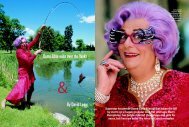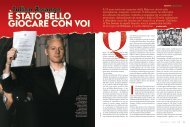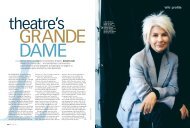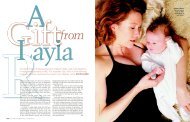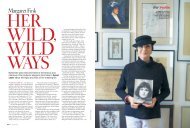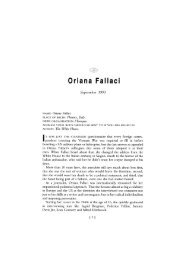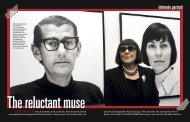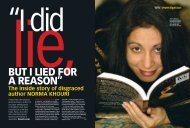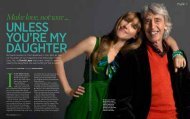social commentator Bettina Arndt has never been ... - David Leser
social commentator Bettina Arndt has never been ... - David Leser
social commentator Bettina Arndt has never been ... - David Leser
Create successful ePaper yourself
Turn your PDF publications into a flip-book with our unique Google optimized e-Paper software.
What<br />
men Want<br />
in bed<br />
<strong>social</strong> <strong>commentator</strong> <strong>Bettina</strong> <strong>Arndt</strong> <strong>has</strong><br />
<strong>never</strong> <strong>been</strong> afraid to ask provocative<br />
questions – particularly when it comes to<br />
Australians’ bedroom behaviour. Here, the<br />
passionate author talks to david <strong>Leser</strong> about<br />
her new book and her controversial opinions.<br />
Let’s not be too prudish about<br />
this. <strong>Bettina</strong> <strong>Arndt</strong> <strong>has</strong> always<br />
loved penises, particularly<br />
erect ones. She says so, gaily<br />
and quite matter-of-factly, a<br />
few minutes into our interview, as though<br />
the subject under discussion were radio<br />
technology or the enchanted flight of the<br />
Monarch butterfly.<br />
“I’ve always <strong>been</strong> fascinated by<br />
erections,” she trills, “because, I suppose,<br />
30 years ago, in the brief period when I<br />
was actually a sex therapist, sitting there<br />
with me were men who were so heartbroken<br />
about the fact that they weren’t getting<br />
erections anymore.<br />
“And in those days, we knew nothing<br />
about erections. We didn’t know what<br />
happened, how it worked, what caused<br />
it to stay up. Nothing.”<br />
Now we do and, for <strong>Bettina</strong>, the scientific<br />
advances are amazing, thrilling, especially<br />
given that so many men seem to have<br />
erectile dysfunction as they get older.<br />
<strong>Bettina</strong> knows this from the research,<br />
but also from what men tell her. They tell<br />
her with stunning frankness how they<br />
can’t get hard anymore, or if they can,<br />
how they can’t keep it that way. They<br />
share with her the fact that their wives<br />
often don’t stroke them properly – she<br />
uses only one hand when two would be<br />
so much better. They tell her what orgasm<br />
is like after a prostatectomy. (It’s dry!)<br />
They tell her about the length of their<br />
penis, their struggle with premature<br />
ejaculations, the hypersensitivity of the<br />
glans after ejaculation. They send photos,<br />
emails, diary entries. They offer up their<br />
anguish, their hunger, their longing. <br />
CORBis.<br />
MODERN LIFE<br />
2 | AWW.COM.AU OCTOBER 2010 | 3
“fEd Up WiTH sTUdying<br />
‘RATs And sTATs’ ...<br />
BETTinA TURnEd HER<br />
fOCUs TO sEx. sOOn,<br />
sHE WAs knOWn As<br />
‘THE dR sEUss Of HEAvy<br />
BREATHing’.”<br />
I began to lose erections. I was utterly<br />
devastated and brokenhearted. It is one<br />
thing to lose a lover, but it seemed to me<br />
that I had lost me. It was as if the most<br />
important part of me had died.<br />
And whereas most men feel they can’t<br />
discuss their shrinking manhood with<br />
their wives and partners, they seem to want<br />
to pour their hearts out to this stranger<br />
who, in truth, is no stranger at all.<br />
<strong>Bettina</strong> <strong>Arndt</strong> first burst<br />
into our bedrooms nearly<br />
40 years ago as the editor<br />
and then publisher of Forum,<br />
the Australian adult sex<br />
education magazine, launched by the<br />
late caftan-wearing Clyde Packer. The<br />
magazine was bold and provocative,<br />
just like its founding editor.<br />
For her first appointment with Packer,<br />
she arrived half an hour late because,<br />
according to Packer at the time, she’d<br />
<strong>been</strong> “trying to make flashers expose<br />
themselves to her in Centennial Park”.<br />
On one occasion in Broken Hill, with<br />
Wendy McCarthy, the then ABC deputy<br />
chair, she began interviewing a group<br />
of miners about their sex lives. “[She<br />
wanted to know] how long they lasted<br />
before ejaculating,” Wendy said, “whether<br />
their wives were happy with the<br />
experiences. These guys didn’t know<br />
what had dropped out of the sky.”<br />
Born in 1949, in England, the<br />
youngest of three children, <strong>Bettina</strong> was<br />
22 and working as a Hertz Rent-a-Car<br />
girl in Sydney when she first read<br />
Germaine Greer’s The Female Eunuch.<br />
The book lit a fuse inside her head.<br />
Spurred on by Greer and the 1960s<br />
sexual revolution, fascinated by the<br />
new Masters and Johnson research<br />
into the wonders of the human orgasm,<br />
fed up with studying “rats and stats”<br />
for her psychology degree, <strong>Bettina</strong><br />
turned her focus instead towards sex.<br />
Soon, she was known as “the Dr Seuss<br />
of heavy breathing”. <br />
Clockwise from top left: bettina arndt<br />
in the early ’70s; with her son, Jesse, in<br />
1982; a 1978 cover of Forum magazine;<br />
with second husband Warren Scott and<br />
Jesse in 1987, in new York; reinvented<br />
as a men’s advocate in 2010; with her<br />
first husband, dennis minogue, in 1980.<br />
4 | AWW.COM.AU OCTOBER 2010 | 5<br />
pHOTOgRApHy By HUgH sTEWART. ACp syndiCATiOn. ROBERT BUTCHER/ACp syndiCATiOn.
In the years since Forum’s<br />
closure in 1981, <strong>Bettina</strong> went<br />
on to enjoy a stellar career as a<br />
columnist, television and radio<br />
broadcaster, feature writer (including<br />
for this magazine) and author and public<br />
speaker on a range of <strong>social</strong> and gender<br />
issues. Often her views were controversial,<br />
particularly as they challenged the<br />
accepted wisdoms of the sisterhood,<br />
which they often did.<br />
In 1993, as a guest reporter for<br />
ABC’s Four Corners program, she<br />
enraged many feminists by challenging<br />
the “party line” that “no must always<br />
mean no” in sexual assault cases. She<br />
felt the lines were more blurred than<br />
that, that for some women, no didn’t<br />
always mean no. Sexual assault<br />
counsellors were appalled.<br />
“We feel that there was in that<br />
program a strong revisitation of the<br />
myth that sexual assault results when<br />
a woman is not clear about saying<br />
‘no’,” said one joint letter from seven<br />
counsellors. “It is our experience from<br />
counselling many, many women after<br />
they have <strong>been</strong> raped, that in most<br />
instances, they don’t get a chance to<br />
say ‘no’. There is no negotiation p<strong>has</strong>e.”<br />
More recently, <strong>Bettina</strong> ignited a<br />
furious response with an article in The<br />
Sydney Morning Herald questioning<br />
Prime Minister Julia Gillard’s unmarried,<br />
childless status and whether this could<br />
“influence other women into making big<br />
mistakes about their lives”.<br />
“iT’s THE WOMEn WHO<br />
End Up sTRAndEd<br />
WHEn THEy spEnd<br />
yEARs ... WAiTing fOR<br />
MR nOT REAdy OR<br />
MR MAyBE TO MAkE Up<br />
His Mind.”<br />
“It’s the women who end up stranded,”<br />
<strong>Bettina</strong> wrote, “when they spend years<br />
in a succession of de facto relationships<br />
waiting for Mr Not Ready or Mr Maybe<br />
to make up his mind. Women’s tiny<br />
reproductive window means they pay a<br />
high price for wasting precious breeding<br />
time in such uncertain relationships.”<br />
<strong>Bettina</strong> then widened her aperture to<br />
include “well-known Australians making<br />
dubious lifestyle decisions being lauded<br />
in the media – celebrities choosing to<br />
become single mothers, unwed fathers,<br />
parents dragging children through a<br />
succession of chaotic, ‘blended’ families.<br />
“Pat Rafter was made Australian of<br />
the Year [in 2002] just as he was about<br />
to become an unmarried father,” she<br />
lamented. “What did that say to his<br />
many male fans about the importance<br />
of committed fathering?”<br />
You could hear the crackle and<br />
thunder of derision. “Get a life, <strong>Bettina</strong>,”<br />
wrote one irate correspondent. “What<br />
a foolish, anachronistic article,” said<br />
another. “Ridiculous, rubbish, a bad<br />
joke from the 1950s,” chimed a third.<br />
“Put your head in the oven, you old<br />
bag,” chorused another. There were<br />
hundreds more like it.<br />
“The Herald <strong>has</strong> <strong>never</strong> seen a<br />
response like that,” <strong>Bettina</strong> says<br />
now. “I’ve <strong>never</strong> had such abusive<br />
letters personally.”<br />
And not just from letter writers.<br />
Catherine Deveny, penning an article for<br />
ABC Online, said, “How can I put this?<br />
The woman <strong>has</strong> done the unthinkable.<br />
Made Cardinal Pell and Sheikh Al<br />
Hilaly’s views on women seem modern.<br />
Scary enough if you think of <strong>Arndt</strong>, as<br />
many do, as a feminist. I’m not sure<br />
she is. She describes herself as a sex<br />
therapist and a <strong>social</strong> <strong>commentator</strong> …<br />
I can confidently describe her as an<br />
uptight white honkie.” (<strong>Bettina</strong> is just<br />
as scathing about Catherine Deveny!)<br />
<strong>Bettina</strong> <strong>Arndt</strong> greets me at<br />
the door of her Sydney<br />
home, on a glorious late<br />
winter morning, with an<br />
outstretched hand and a<br />
light peck on the cheek. In her grey<br />
jeans, pink top and tanned, lean frame,<br />
she is, at the age of 61, a picture of<br />
feminine self-possession.<br />
This is our first meeting, although<br />
we’ve spoken previously by phone,<br />
the last occasion to arrange this<br />
interview. During that conversation,<br />
she was nothing if not frank, advising<br />
me of her upcoming colonoscopy and<br />
suggesting I pay particular attention<br />
to the five chapters of her latest book<br />
on erections.<br />
Continued on page 318.<br />
CORBis.<br />
6 | AWW.COM.AU OCTOBER 2010 | 7
What men Want in bed COntinUed ...<br />
The interview begins agreeably<br />
enough, when I ask her why she’s<br />
spent so long in the thrall of men’s<br />
sexual proclivities. “I’ve always <strong>been</strong><br />
interested in men,” she replies. “I<br />
suppose, for many, many years, I’ve<br />
<strong>been</strong> interested in sex.”<br />
You mean you like it? “I like it,” she<br />
says, with great emp<strong>has</strong>is. “I like it. I<br />
remember the first penis I ever saw.<br />
I had this first true love. I was 17 and<br />
thinking, ‘My God, that’s amazing’. I’ve<br />
always thought it’s the most wondrous<br />
thing. And it is. The more you learn<br />
about the penis, the more you think<br />
it’s extraordinary. It’s this intricate<br />
mechanism. And I thought it was the<br />
most beautiful thing.”<br />
<strong>Bettina</strong> <strong>has</strong> always <strong>been</strong> plain<br />
speaking – in the past, she <strong>has</strong> written<br />
about her own “sluggish ovaries”, her<br />
husband’s “vital deposits”, the inserted<br />
“thermometer”, the “broken condom”<br />
that would produce the “miracle of<br />
conception” of her first child – so it<br />
seems fair enough to ask her whether<br />
the clitoris might be just as remarkable<br />
as the penis, if not more so. “That’s<br />
true,” she says. “The clitoris is pretty<br />
amazing, too.”<br />
Yet you’ve <strong>been</strong> bewitched by the<br />
penis? “Look, I’ve <strong>been</strong> very oriented<br />
towards men all my life because I grew<br />
up with two older brothers and I spent<br />
my life running after them, wanting to<br />
be part of their play.”<br />
<strong>Bettina</strong> once lovingly described her<br />
first husband, The Age journalist and<br />
her business partner Dennis Minogue,<br />
as a “Neanderthal” and she says now<br />
there is still part of her “that is attracted<br />
to that sort of man”. (Dennis Minogue<br />
died, suddenly, in 1981, at the age of<br />
37, leaving <strong>Bettina</strong> as a single mother to<br />
their then five-month-old son, Jesse.)<br />
Her second husband, American<br />
lawyer, Warren Scott, whom she married<br />
in 1986 and had two children by, Taylor,<br />
now 22, and Cameron, 19, once referred<br />
to his wife as “terribly un-reconstructed”<br />
in her relationship to men. (The couple<br />
was divorced three years ago.)<br />
<strong>Bettina</strong> doesn’t deny her male bias.<br />
“Probably [true],” she says, “because<br />
I’m not at all sure that it’s <strong>been</strong> in the<br />
interests of men and women to try to<br />
shape men entirely in terms of the sort<br />
of men women want.”<br />
All good so far. The conversation<br />
turns frosty, however, when I raise the<br />
recent Herald article on Julia Gillard<br />
and Patrick Rafter’s lifestyle choices.<br />
Did she not think her story overly<br />
judgemental? “I’ve written that story a<br />
dozen times,” she says, stiffly, “the story<br />
about the fact that there are certain<br />
problems with cohabitation.”<br />
What problems? “There is nothing<br />
wrong with living together,” she says.<br />
“I’ve spent years of my life living with a<br />
man and I would do it again, maybe. I<br />
would <strong>never</strong> marry again, but I would<br />
certainly live with someone again.<br />
“There’s certainly no problem for<br />
a woman of Gillard’s age living with<br />
someone. The only problem for women<br />
comes if they want to have children<br />
and they end up living with a man<br />
for long periods during, particularly<br />
their 30s, where they haven’t spelt<br />
out whether they have the same<br />
expectations of a relationship.<br />
“And then they may find themselves<br />
in a situation where they miss out on<br />
that critical narrowing window of<br />
opportunity to have children. And I<br />
have had hundreds of letters from<br />
people who say, ‘You are quite right<br />
about that’.”<br />
So you’re promoting marriage as<br />
the way to secure having a child? “No,<br />
I’m saying if women want to have<br />
children, as most do … the difference<br />
between marriage and cohabitation<br />
is the question you ask at the beginning<br />
of a relationship.<br />
“I didn’t make this idea up,” she<br />
continues, heatedly. “The Institute<br />
of Family Studies did research on<br />
cohabitation, where they find that,<br />
at the start of cohabitation, what<br />
differentiates cohabiting relationships<br />
from marriage are the discussions<br />
around expectations. And in many de<br />
facto relationships, many people don’t<br />
sit down at the start and say, ‘Are you<br />
interested in a permanent relationship?’<br />
‘Are you interested in children?’ ”<br />
<strong>Bettina</strong>’s bottom line is that<br />
“family structure matters” and that<br />
all the research proves de facto<br />
relationships are “less stable than<br />
marital relationships”.<br />
When I question this further, <strong>Bettina</strong><br />
yells indignantly from the kitchen – over<br />
the froth and steam of the cappuccino<br />
machine – that child support agencies<br />
confirm what she is saying, “that married<br />
fathers are more likely to support their<br />
kids than de facto, financially”.<br />
I ring the Child Support Agency<br />
in NSW after our interview and its<br />
spokesman says, “It is our job to<br />
facilitate the transference of money<br />
between parents for the benefit of<br />
children. We are not in the business<br />
of relationships and whether they are<br />
stable or not. I don’t know where she<br />
is getting that from.”<br />
I check then with Relationships<br />
Australia (NSW). Anne Hollonds,<br />
chief executive officer, suspects<br />
<strong>Bettina</strong> is right in saying de facto<br />
relationships are probably less<br />
stable than marriages. However,<br />
75 per cent of people who marry<br />
start off living together anyway.<br />
Anne also points out that de facto<br />
relationships of two years or more<br />
now have the same legal standing<br />
as marriages.<br />
“I have worked with a lot of married<br />
couples,” she says, “and they often hit<br />
a wall because one thought the other<br />
agreed to have children and they find<br />
out, five years later, that they didn’t.<br />
So, I am much more interested in how<br />
we work effectively to turn a romantic<br />
relationship into a partnership. Getting<br />
a marriage certificate isn’t necessarily<br />
going to do that.”<br />
<strong>Bettina</strong> returns from the kitchen with<br />
our cappuccinos. The froth is nearly<br />
overflowing and, by her own admission,<br />
she is “pissed off”. With this interviewer,<br />
not the coffee machine.<br />
I press on. Why take aim at Patrick<br />
Rafter’s commitment to fathering simply<br />
because he was unmarried at the time?<br />
“I was interested not in his choice,” she<br />
says, “but in the choice of making him<br />
Australian of the Year, when Australian<br />
of the Year <strong>has</strong> to be all about values<br />
and admirable lifestyle.”<br />
I suggest this is a very conservative<br />
position to adopt. She counters by saying<br />
there are millions of fathers who have<br />
disengaged from their children. I agree<br />
with her, but ask whether this might not<br />
apply to men, married or not. No, she<br />
says, it’s far less likely with married men.<br />
Then she erupts when I question again<br />
the <strong>social</strong> science research she’s relying<br />
on to prosecute her arguments. “I don’t<br />
think there’s any point in talking to you,”<br />
she says. “Nothing I say is going to<br />
convince you.”<br />
The coffee’s turning cold.<br />
<strong>Bettina</strong> <strong>Arndt</strong> was probably<br />
programmed to argue. Her<br />
beloved father was the famous<br />
German-born economist,<br />
Heinz <strong>Arndt</strong>, who resigned<br />
from the Australian Labor Party over<br />
Gough Whitlam’s decision to go to China<br />
in 1973. A public intellectual and linguist,<br />
he loved the thrust and parry of ideas.<br />
In his latter years, he moved<br />
increasingly to the right of the political<br />
spectrum, much to the dismay of his<br />
wife, Ruth, <strong>Bettina</strong>’s mother, who as a<br />
teenager, was forced to flee the Nazis<br />
after writing an anti-Nazi paper for her<br />
“i AM THis pARTiCULAR<br />
LOnE vOiCE ... BECAUsE<br />
iT JUsT dRivEs ME nUTs<br />
THAT nO OnE is<br />
pREsEnTing THE MALE<br />
pOinT Of viEW.”<br />
final exams. Ruth was smuggled out of<br />
Germany in a fishing boat to England,<br />
where she was taken in by a Quaker<br />
family. She won a scholarship to the<br />
London School of Economics, before<br />
earning a degree in <strong>social</strong> work. She<br />
met her husband while helping families<br />
recover from the London bombing.<br />
Both parents were “extraordinary,<br />
amazing” people, but her mother suffered,<br />
in her later years, from the sense of<br />
having <strong>never</strong> fully realised her potential.<br />
Their home was often “a battleground”<br />
of competing ideas and interests.<br />
I ask <strong>Bettina</strong> whether the “deep bond”<br />
she shared with her father might have<br />
shaped her benign view of men (read<br />
“obsessively apologist” view, to some of<br />
her detractors) and she agrees this is<br />
“probably true”.<br />
This pro-male bias was brought into<br />
sharp relief three years ago, with the<br />
publication of The Sex Diaries, <strong>Bettina</strong>’s<br />
raw and intimate account of 98 couples’<br />
bedroom behaviour. The pages were<br />
bathed, particularly, in male anguish<br />
and frustration at being sexually rejected<br />
by partners whose libidos were far more<br />
“distractable and fragile”.<br />
“Here were these men,” says <strong>Bettina</strong>,<br />
“who would ask again and again, and try<br />
and plead and grovel and cook the dinner,<br />
whatever they thought was going to work<br />
to get the green light, and they got knocked<br />
back again and again and again.”<br />
<strong>Bettina</strong>’s advice to both men and<br />
women – but mainly women – was<br />
for them to “get over that ideological<br />
roadblock of assumptions about desire<br />
and ‘just do it’ ”. “Once the canoe is in<br />
the water, everyone starts happily<br />
paddling,” she said.<br />
Now, <strong>Bettina</strong>’s new book, What Men<br />
Want – In Bed, lifts the lid further on<br />
men’s fears, frolics and frustrations,<br />
and why it is that sex matters so much<br />
to them. She quotes American author<br />
Philip Roth as saying, when he turned<br />
70, “Nothing is put to rest, however<br />
old a man may be”.<br />
For this latest book, more than 150 men<br />
kept diaries about what it is like to live<br />
with the all-consuming sexual itch.<br />
There is the 71-year-old virgin who <strong>never</strong><br />
finds the right woman, so he puts himself<br />
on medication to reduce his sex drive.<br />
There is the man who leaves his wife<br />
after being denied sex for 19 years.<br />
There is another – a pensioner –<br />
who, with his wife’s approval, enjoys<br />
wearing her knickers under his<br />
bowling shorts.<br />
There are the men who turn to<br />
pornography as a consolation prize for<br />
being continually refused sex. There are<br />
the happily married men who, instead<br />
of taking up golf on retirement, turn to<br />
other men for occasional dalliances. And,<br />
of course, there are the countless men<br />
with penile problems, for whom <strong>Bettina</strong><br />
provides heartfelt and current advice.<br />
<strong>Bettina</strong> believes the <strong>social</strong> debate <strong>has</strong><br />
<strong>been</strong> dominated by women for more than<br />
30 years and, quite frankly, she’s sick of<br />
it. It’s the reason she finds herself regularly<br />
drawn, “like a moth to the flame”, to the<br />
battle of ideas, just as her father once was.<br />
“The whole point is we wouldn’t be<br />
here if my voice wasn’t really unusual,<br />
defending men,” she says now. “That’s<br />
why we’re having this discussion. And<br />
what does that say? It says that the barrage<br />
is from the other side, the barrage of<br />
calling men to account for their behaviour,<br />
for telling them off for what they’re doing<br />
… that’s the message that’s <strong>been</strong> out<br />
there for almost 30 years.<br />
“And I am this peculiar lone voice …<br />
because it just drives me nuts that no<br />
one is presenting the male point of view.”<br />
After two hours of sometimes fierce<br />
debate, the mood finally softens and<br />
<strong>Bettina</strong> takes me to her upstairs office<br />
to show me her “Peter Metre”, the<br />
contraption she keeps on her desk that<br />
measures the rigidity of a man’s penis.<br />
Designed by the manufacturers of<br />
Viagra, it is a spherical rubber object<br />
divided into four sections (1,2,3,4) of<br />
varying hardness, so that the doctor<br />
can rate the man’s level of stiffness.<br />
“Feel them all and you will see,”<br />
she says.<br />
That’s hard, I say, squeezing number<br />
3. “Yeah.”<br />
That one (number 2) is a bit softer.<br />
“Yeah … so what is your typical penis?”<br />
You’re not asking me, are you? “No,”<br />
she replies, laughing. “I could.”<br />
It’s obviously number 4. “Of course,<br />
it is. Completely hard and fully rigid.<br />
There you are. Isn’t that clever? I think<br />
it’s very clever.”<br />
Yes, it is, but I’m sure it’s time to go. n<br />
What Men Want – In Bed by <strong>Bettina</strong> <strong>Arndt</strong>,<br />
published by Melbourne University Press,<br />
$34.99, is available now.<br />
8 | AWW.COM.AU OCTOBER 2010 | 9



